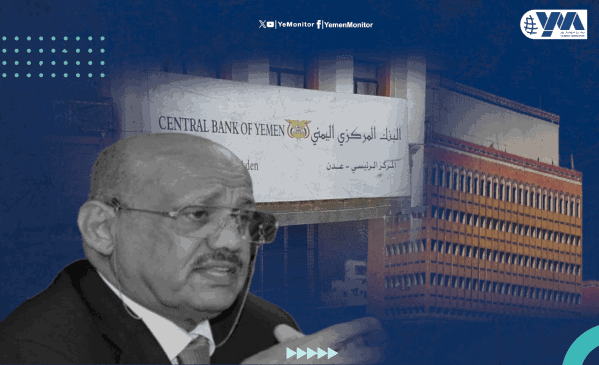Will the Central Bank’s Statement Limit the Deterioration of the Local Currency?
By Iftikhar Abdo

Yemen Monitor/ Special Report:
The local currency has witnessed an unprecedented deterioration against foreign currencies, which has increased the discontent of citizens and turned living conditions into an unbearable hell.
The impact of this collapse was not limited to the rise in food prices, as some might think; rather, it extended to the deterioration of basic services, such as health and education, and the exacerbation of poverty and unemployment rates among Yemenis, which threatens a major disaster.
This deterioration was met with great silence from the Presidential Leadership Council and the legitimate government, which were supposed to explain the reason for this to the people and work to limit this collapse.
The dollar price exceeded the 2,350 barrier, and the Saudi riyal exceeded the 600 barrier, amid an indication of a further increase in the price of foreign currencies against the local currency.
On Wednesday, February 12, 2025, the Central Bank in Aden issued official directives to close all exchange shops in Aden, Marib, and the rest of the governorates under the control of the legitimate government, due to this unprecedented deterioration.
The director of the Central Bank branch in Marib said in press statements that they had directed the closure of all exchange establishments and companies in the governorate indefinitely, in protest against the deterioration of the currency’s value.
Afterward, the Yemeni Central Bank in the capital, Aden, directed the closure of all exchange shops in the liberated governorates and the immediate halt of all financial operations, in a move aimed at curbing the collapse of the local currency.
The Central Bank accused government entities – which it did not name – of not dealing with the available resources in a way that keeps pace with the challenges and addresses the obligations according to their importance and priorities; rather, it has disabled the use of important sovereign resources that contributed to providing the minimum level of services.
This statement was described by some as a good step, while others saw it as not the appropriate solution to the suffocating crisis that the Yemeni reality is witnessing.
A Call to the Presidential Council to Support the Central Bank Only
In this regard, the researcher in economic affairs, Waheed Al-Foudai, says, “The Central Bank’s statement in Aden placed the responsibility on the Presidential Leadership Council, while the responsibility is shared between them, as the Central Bank is a partner in managing monetary policy, which is part of the overall economic policy.”
Al-Foudai added to “Yemen Monitor” that the Central Bank is truthful in the statement it issued, in its talk about the reasons that led to the collapse of the local currency and its diagnosis of the problem that everyone knows, which is the targeting of oil, and Yemen’s loss of more than 70% of the revenues that support the state’s general budget in foreign currency, which was a major supporter of the Central Bank, as well as its talk about speculation in the currency.”
Al-Foudai pointed out that “what is happening to the exchange rate today is the result of overlapping factors, including real economic factors represented by oil exports and the scarcity of foreign currency revenues, and other political factors represented by the Houthi group and some parties that want to destabilize the economy in the areas of the legitimate government, and the most important aspect is the currency speculators who are wreaking havoc on the land without real oversight against them by the legitimate government.”
He continued, “The Central Bank’s statement represents an invitation and an appeal from it to the Presidential Leadership Council to stand by it by assuming responsibility because the responsibility is shared between them, and therefore the statement of the bank clarifies that it is not the only one responsible for this crisis, as the blame is usually directed towards the Central Bank, and it wanted to remind the Leadership Council and the government that they should bear responsibility and be on the side of the Central Bank.”
He stressed that “the legitimate government, which is shirking its duties and we have not noticed any movement from it regarding this suffocating crisis, and which the Prime Minister is supposed to be at the forefront of confronting this crisis, he and the Presidential Leadership Council must seize the opportunity of classifying the Houthis as a terrorist organization and work to stabilize the local currency through that.”
Temporary Measure
In the same context, Dr. Muhammad Ali Qahtan, Professor of Economics at Taiz University, says, “Stopping exchange shops, as it seems, is a temporary measure to arrange new conditions for the monetary market and has no effect to stop the deterioration.”
Qahtan added to “Yemen Monitor” that the process of limiting the collapse of the value of the Yemeni riyal in its new print depends on the availability of political and executive will from the Presidential Council and the government that supports the Yemeni Central Bank, the most important of which is the return of state institutions from abroad and the cessation of disbursing the salaries of state institution employees in US dollars, and at the same time restoring state institutions and confronting corruption in the state’s revenue streams.
He pointed out that “the reasons for the recent deterioration of the value of the Yemeni riyal in its new print are due to a number of reasons, the most important of which are: the absence of state political, executive, legislative and advisory institutions, as well as the corruption of state revenue streams and the continued plundering of public funds, and the rise in external spending and the deepening of the balance of payments gap.”
He continued, “Among the reasons also: the intensification of speculation in foreign currencies (the US dollar and the Saudi riyal); as every time the political and military conflict intensifies, it leads to more leakage of foreign currencies abroad by the war traders for the sake of laundering the money they earn in illegal ways, as well as more flight of national capital abroad.”
He continued, “The continued cessation of oil and gas exports and at the same time the sharp decline in international humanitarian aid, and the failure of the donor conference are among the most important reasons for the deterioration of the local currency against foreign currencies.”
The Living Situation Will Not Improve With the Presence of the Presidential Leadership Council
For his part, political analyst Abd Rabbo Othman says, “The position of the Presidential Leadership towards the Yemeni crisis and towards the accelerating collapse of the local currency against foreign currencies is a paralyzed and crippled position – unfortunately – as it has no sense of responsibility towards its people or the performance of the tasks assigned to it.”
Othman added to “Yemen Monitor” that “when this council came, it came with slogans of improving living conditions, which were then not bad, and the people at that time were finding their daily sustenance – at least – so this council came with the slogan of improving the living situation, while the truth is that it worked to improve the conditions of the eight people and their entourage only, and threw the people into a pit of living doom.”
He added, “I do not believe that this statement will work to improve the living situation as long as the Presidential Council with its eight members are still on the chairs of greed and avarice that they are on today, yesterday and tomorrow.”
Othman wondered, “How can these eight spend their nights while there are those who have no food, and those who have no electricity, and those who do not have the value of medicine?! How do they appear on the screens with smiling faces while their people are crying from hunger and deprivation?!”
He continued, “such people have not been fruitful in war or liberation, nor have they even advanced an inch in achieving an improvement in the economic conditions of our exhausted and miserable people; rather, the conditions under their continued presence are deteriorating to the worst and bitterer over the minutes and seconds; and therefore statements will not be useful as long as the leaders are with this deliberate complacency towards the crisis.”





